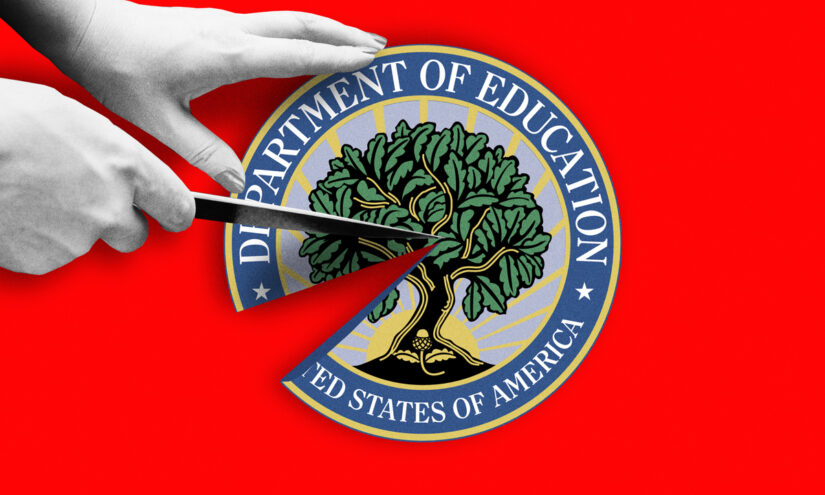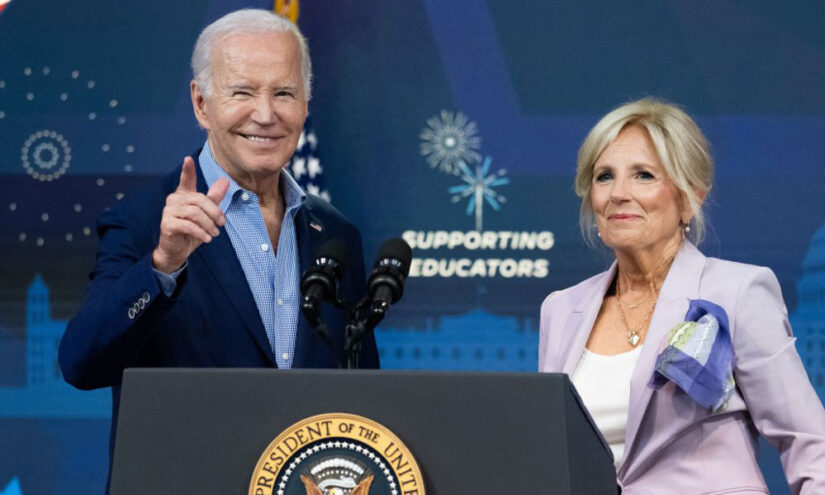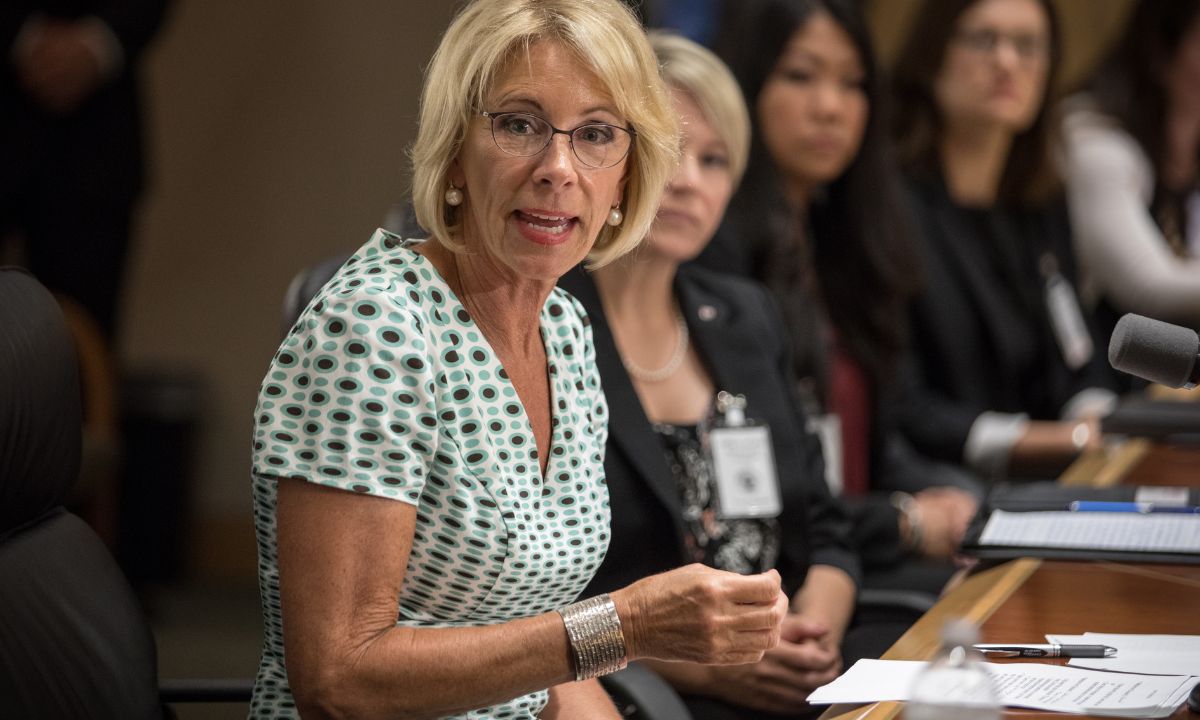Reflecting on the tenets that shape our educational practices is fundamental for …
Project 2025 to Reduce Education Department and Implement Conservative K-12 Policies in Trump Administration
Jennifer Livingstone

A bold Republican agenda aiming to overhaul the federal bureaucracy in a potential second term under Trump would profoundly impact the field of education, envisioning the U.S. government as a defender of parents’ rights and restructuring longstanding programs to promote school choice.
The comprehensive program, titled Mandate for Leadership, serves as a roadmap for conservative governance, spanning 43 bullet-pointed pages with the education section proposing significant changes, such as eliminating Title I grants to high-poverty schools and revising accreditation requirements under the Higher Education Act.
The ultimate objective is the complete elimination of the Department of Education, with its functions and responsibilities likely shifted to states or other agencies. However, achieving this goal may encounter challenges, according to Jack Jennings, a former top education aide for House Democrats.
In the event of the Department’s persistence, the plan offers a systematic approach to decreasing the federal government’s involvement in schools over the next four years by gradually transferring agencies until minimal federal oversight remains, providing a step-by-step process.
“They want to eliminate the department in the long run, but the short-term strategy involves spinning off agencies until nothing significant remains,” Jennings explained.
As the Republican National Convention highlights the party’s governance aspirations this week, this text could become the face of conservative policies throughout the campaign.
Mandate for Leadership, conceived by the conservative Heritage Foundation as part of Project 2025 to guide the next presidential transition, represents the latest in a series of influential policy documents issued by Heritage, shaping agendas for Republican presidents and candidates spanning back to the Reagan era.
Each of its 30 sections focuses on restructuring various facets of the U.S. government in anticipation of a GOP victory in November, aiming to grant President Trump the authority to dismiss and replace multiple civil servants, colloquially referred to as part of the “deep state.”
The chapter also delves into intricate specifics rarely seen in policy documents, meticulously outlining regulations and executive orders proposed for elimination or reinstatement.

President Trump recently disavowed any association with Project 2025, denouncing certain concepts as “absurd and deplorable,” leading to a wave of criticism from Democrats and the media. Ohio Sen. J.D. Vance, who was announced as Trump’s running mate, stated in a recent interview that only Trump would dictate the priorities of a potential administration, largely sidestepping education in his proposals.
Despite Trump’s disassociation, the education segment of Mandate for Leadership mirrors the GOP’s official 2024 platform, pledging to expand school choice, decentralize educational authority to states, and confront “gender indoctrination” in classrooms.
Several longtime education analysts believe that these objectives could be achieved with supportive courts and Republican congressional majorities, presenting both an ideological vision and a strategic roadmap for realization as outlined chapter by chapter in the document.
It’s the most precise that any candidate for president has been in terms of what they’re going to do in office.
Jack Jennings, former Democratic House staff member
“This is exceptionally significant,” Jennings remarked. “In my experience, it’s the most specific any presidential candidate has been regarding their intended actions while in office.”
NEA as ‘radical’ interest group
Authored by Lindsey Burke, director of the Heritage Foundation’s Center for Education Policy, much of the education chapter in Mandate advocates for a substantial reduction in Washington’s authority.
Title I, a program allocating $18 billion to nearly two-thirds of public schools, would transition to the Department of Health and Human Services, distributed as an unrestricted block grant to states; states would gradually assume full funding responsibility within ten years. Similarly, approximately $14 billion in special education funding under the Individuals with Disabilities in Education Act would be transferred to HHS.
Burke’s proposal suggests targeted funding to eligible families through “micro-education savings accounts” to be used for educational expenses, such as private school tuition. Federal authority could also expand school choice in schools under U.S. government jurisdiction by providing ESAs to students in Washington, D.C., schools on military bases, and on tribal lands.

The chapter further suggests revoking the special congressional charter of the National Education Association, deemed a “demonstrably radical special interest group” by Burke. The charter, established in 1906 to recognize the NEA’s educational mission, has sporadically faced scrutiny for exempting the organization from property tax payments on its substantial D.C. headquarters.
The proposed revocation’s tangible implications may be minimal but would tarnish the prestige of the nation’s largest labor union. The NEA declined to comment on the proposition, while the Heritage Foundation abstained from remarks related to this.
Lastly, Burke emphasizes the necessity for enhanced safeguards for family autonomy, including legislation enabling parents to seek legal recourse if federal policies undermine their right to raise, educate, and care for their children. Additionally, schools under federal jurisdiction would be prohibited from using names or pronouns other than those on students’ birth certificates without parental consent.
Melanie Willingham-Jaggers, executive director of the LGBT advocacy group GLSEN, voiced concerns that such changes could afford parents “greater judicial scrutiny than victims of sex discrimination.”
Project 2025 exists outside the bounds of common decency and is a roadmap for an extremist refashioning of the United States.
Melanie Willingham-Jaggers, GLSEN
“Project 2025 exists outside the bounds of common decency and is a roadmap for an extremist refashioning of the United States that erases legal recognition of marginalized communities and tears apart the threads that bind our nation together,” expressed Willingham-Jaggers.
Chester Finn, a senior fellow at the conservative Hoover Institution, and former assistant secretary of education in the Reagan administration, characterized Burke’s plan as a blend of conventional conservative advocacy for reduced federal involvement alongside proposed new regulations and programs.
“The chapter appears somewhat dichotomous to me,” Finn observed. “It heavily leans towards abolishing existing structures, with a minority share dedicated to introducing new initiatives we aim to implement. Leveraging their newfound federal power, their intent is to push these changes through.”
The chapter is a little schizophrenic. It’s about 70 or 80 percent ‘Let’s do away with this,’ and 20 or 30 percent ‘Let’s do new stuff we want to get done.’
Chester Finn, Hoover Institution
The education segment, both forceful and expansive, represents the most definitive declaration of policy intentions articulated by Trump and conservative allies in recent years. Pledging to grant more autonomy to states in education or possibly federalizing the K–12 pursuits of Republican-led states advancing school choice and parental rights laws, the document also indicates diminished interest in propelling new federal policies and programs.
Recent education controversies, including COVID-induced school closures and debates about trans inclusion in youth sports, fueled a parent empowerment movement that gained national traction but experienced some reduced momentum as entities like Moms for Liberty and political contenders like Florida Gov. Ron DeSantis found it challenging to translate support into substantive political gains at a national level.
An evaluation by the Brookings Institution highlighted that only 54 of the 166 candidates endorsed by Moms for Liberty emerged victorious during the 2023 local election cycle, while a scandal involving one of the group’s founders detracted from organizing efforts for the upcoming election.
A wave of Republican governors took strides beginning last year by initiating or expanding ESA programs in their states, yet sustained accomplishments on culture-related matters proved more elusive. Louisiana Gov. Jeff Landry’s highly-publicized proposal to exhibit the Ten Commandments in every K–12 classroom has encountered skepticism, even among judges appointed by Republicans.
Democrats have pinpointed Project 2025 as their primary target, particularly as doubts arise regarding President Biden’s candidacy on the party’s ticket for reelection. While most Americans remain uninformed about the initiative, a significant minority express negative sentiments towards it.
Heath Brown, a John Jay College professor specializing in presidential transitions, noted that K–12 schools may not hold as central a role in Trump’s political agenda compared to issues like trade and immigration.
“It’s a peculiar irony considering the emphasis on education within the conservative movement in recent years,” Brown commented. “However, the Trump campaign and MAGA movement seem less preoccupied with educational matters today compared to 18 months ago.”
The president’s critical year one
The realization of the Mandate education blueprint hinges significantly on developments over the next 18 months.
If Trump secures a second term, Republicans would need to retain control of the House of Representatives and recapture the Senate to advance legislation regarding parental rights or downsizing the Department of Education. Jennings emphasized that given the contentious nature of these proposals, swift presidential action would be imperative.
“The president’s authority is most formidable in the initial year of office,” Jennings underscored. “It’s a four-year tenure, and to accomplish anything, he must act promptly.”

In the intensely polarized atmosphere of the 2020s, newly elected presidents experience elevated approval ratings and maximal sway with Congress in the wake of their elections. Nevertheless, restructuring government operations remains a protracted endeavor; for instance, when former Education Secretary Betsy DeVos aimed to amend Title IX regulations concerning sexual assault on college campuses, the revision process spanned nearly the entire first Trump term. President Biden’s Department of Education also spent a substantial amount of time revising these regulations back to pre-Trump standards.
Dismantling an entire cabinet department or redistributing its responsibilities across the executive branch would present significantly greater complexities, as indicated by Brown. Even Republicans supportive of Trump’s platform may push back if it becomes evident that their constituents stand to lose federal funding. Conversations within conservative state legislatures like Tennessee and Oklahoma regarding rejecting federal funds linked to gender identity recognition mandates have thus far faltered.
“The White House would encounter strong opposition on each of these proposals, including pushback from Congress advocates of these programs with whom the administration must cooperate, and career officials knowledgeable about the legal entrenchment of these programs,” he postulated.
However, several core ideas from the Mandate for Leadership could potentially be pursued without congressional sanction. Most notably, the reinstatement of a previous Trump-era executive order known as Schedule F, aimed at simplifying the termination of numerous federal employees in policymaking roles, could reshape the Department of Education, among numerous agencies, although the process to identify and replace targeted civil servants would likely span years.
I really think you could do a fair chunk of this in a single term if you had the right stars aligned in Congress. Not many of these things are unconstitutional on their face; therefore, changing laws and regulations, particularly with a conservative Supreme Court, would likely withstand challenges
Chester Finn, Hoover Institution
Finn, in support of an “intelligent voucher system” for federal programs like Title I in principle, asserted that the bulk of the Project 2025 agenda could be plausibly achieved through a concentrated effort.
“I’m confident that a significant portion of this could be accomplished within a single term with favorable conditions in Congress. Most proposals aren’t inherently unconstitutional; therefore, changing laws and regulations—especially with a conservative Supreme Court—would probably withstand challenges,” Finn concluded.






